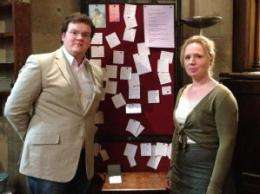People praying online are more likely to pray for themselves

People accessing the power of prayer online rather than visiting a church are much more likely to pray for themselves rather than someone they know.
A study from the University of Warwick analysing the prayers submitted to the Church of England’s Say One For Me website found that 34% of people had prayed online for help with their own personal issues, compared to just 3% or 4% of traditional handwritten prayers left in churches. These online prayer authors were particularly concerned about their work or relationships, as well as their personal spiritual or moral issues.
The number of prayers submitted for friends or loved ones also fell from 75% of church notes, to 57% online.
Say One for Me is a website for intercessory prayer, where the prayer author is asking for a designated group of Christians to pray prayers on their behalf.
The paper has recently been published in the Journal of Beliefs and Values.
Lead author Dr Tania ap Sion, Senior Research Fellow in the Institute of Education at the University of Warwick, said previous studies had shown the more traditional prayer notes left in churches and chapels usually asked for help with other people’s illnesses or remembered the dead.
She said: “We are seeing a different kind of prayer coming through from people using the Church of England website. There are still more prayers submitted for people known to the authors, but the number of people submitting prayers about their own situations has gone up quite dramatically
“It may well be that the online prayer provision is available at a time of need more easily than going to church. It allows a more flexible time frame and unlimited space as well as more anonymous and personal reflective location in which prayer authors were able to articulate their requests. This may explain why many prayer authors were able to reflect on the potentially more complex issues of relationships and work.”
The research project was carried out in partnership with Owen Edwards from Glyndwr University in Wales. He said the response to the site showed people still felt a need for prayer.
Owen Edwards said: “All the deep needs of life were there expressed on the website. Many people clearly feel the need for prayer, and feel the need to ask others to say a pray for them. The online age has not put an end to the human desire to reach out to God in prayers, but has provided a new way of doing so.”
The study analysed 290 prayer requests submitted during Lent to the Say One For Me Church of England website, now renamed Pray One For Me.
More information: ‘Praying ‘online’: the ordinary theology of prayer intentions posted on the internet’, Tania ap Sion and Owen Edwards, Journal of Beliefs and Values, 33 (1), 2012, pp 95-109
Provided by University of Warwick
















